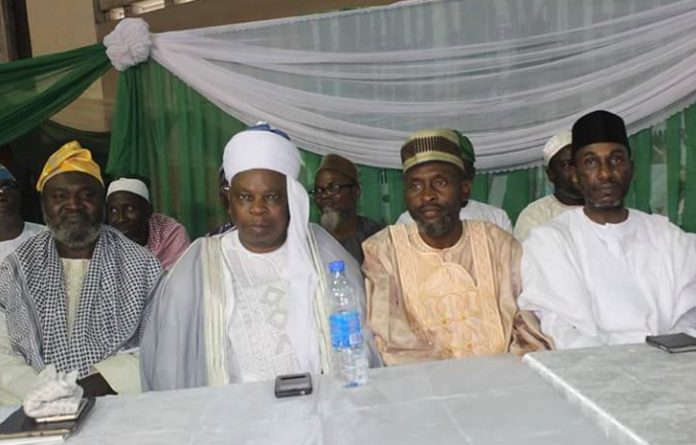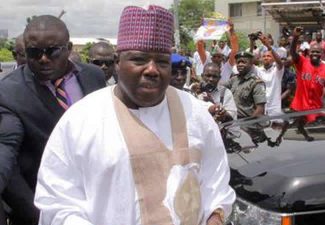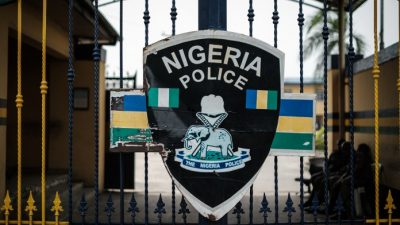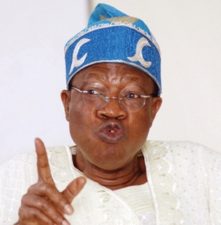Thousands of Muslims thronged the Indoor Sports Hall of the National Stadium, Surulere, Lagos, for the penultimate leg of The Muslim Congress (TMC) Annual Lecture, which has been held across seven states of the federation and the FCT to commemorate Nigeria’s 57th Independence anniversary.
Interestingly, the seven states and FCT, Ogun, Oyo, Niger, Osun, Ondo, Edo, Lagos, and Abuja – all featured the same theme, ‘Confronting the Tripod of Bad Governance, Political Corruption and Tribalism: Islamic Antidotes’. The lectures were delivered by respected and prominent Islamic scholars in Nigeria. The last leg was held on Sunday, October 22 at the Nimatoni Event Centre, New Yidi Road, Ilorin, Kwara State.
The Amir of TMC, Dr. Abdurraheem Lukman said the organisation x-rayed the Nigerian polity and came to the conclusion that the tripods that constitute this year’s theme are the monsters threatening our development. By so doing, the TMC wants to provide antidotes to Nigeria’s problems from the religio-intellectual perspective.
“We equally want to change the narratives out there about the real problems of Nigeria”, he added.
Interestingly, all the guest lecturers who spoke at the annual TMC Independence lectures in different states bemoaned the level at which corrupt practices had eaten deep into the fabric of the Nigerian system, and called for the adoption of God-consciousness as a strategy to turn things around for a national rebirth.
Two weeks ago in Lagos, Professor of Islamic Studies at the University of Port-Harcourt, AbdulRazaq Kilani, highlighted several ways corruption has negatively impacted the Nigerian society. Kilani defined governance as the relationship between the government and the governed. He further painted the worst case scenario of the challenges that corruption has bred into the Nigeria system.
“In the worst cases, it costs lives through our dilapidated roads, consulting clinics and hospitals; the Boko Haram insurgency and its fatalities; and increased infant mortality and maternal mortality due to the failure of our hospitals.
“It also costs people their freedom, health and money; and children hawkers due to lack of access to education, as well as the housemaid syndrome”, he concluded.
In his lecture, Alhaji AbdurRasaq AbdusSalam, the Deputy Director, Programmes at the Voice of Nigeria (VON), blamed the nation’s woes on preferential policymaking and market protectionism.
He also cited the allocation of foreign exchange at preferential rates from the Central Bank of Nigeria (CBN) to government cronies at the expense of those who really need it, and the preferential granting of tax breaks to government’s corporate favourites.
Earlier in Ogun State at the MKO Abiola Stadium in Abeokuta, Dr. Tajudeen Yusuf, a Senior Lecturer in the University of Lagos, stated that for necessary transformation and good governance to materialise in Nigeria, there is need for Nigerian leaders to access the same public services available to the ordinary citizens, such as electricity, education and health services.
Dr. Yusuf asked Nigerians to retrace their steps to Allah by identifying why they were created by Him and carry on in life bearing in mind that they will be accountable to Him.
Professor Taofeek Abdul-Azeez of the University of Abuja condemned those criticising the Buhari administration’s efforts against corruption.
The Chief Imam of the University of Abuja, who was represented by Ustaz Saheed Abdur-Rauf said the allegation that the fight against corruption of the Federal Government is sectional is like calling for quota system or federal character in the anti-corruption campaign.
Last weekend in Ilorin, Kwara State, Ustadh Nasir AbdulQadri called for a change of mindset among Nigerians and reiterated the need for them to seek knowledge for national patriotism and for the benefit of the society through innovation and product development.
He said: “Restructuring of our mindset is very germane. We must do away with the thinking of the national cake. The citizenry must expand their indices for choosing leaders in order to have highly knowledgeable and selfllessly patriotic leaders at all levels. Improvement of national re-orientation so as to entrench the right and positive societal values is also important. Patriotism and love for the nation must also be broadened.”
In his final submission, he called on Nigerians to obey good laws that advance the interests of the society and mitigate the excesses of people and government.
“We should be courageous enough to become rebels against any untoward actions and inactions by the leaders or groups of people, and any actions that are not in consonance with our core values’, he concluded.




